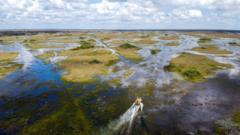How Will Rangers' £20M Rebuild Transform the Team?

Rangers' New Era: A £20 Million Investment and the Path Ahead
The recent investment of £20 million into Rangers Football Club by a consortium led by Andrew Cavenagh and Paraag Marathe marks a pivotal moment for the club as it seeks to revive its fortunes in Scottish football. With Celtic having dominated the Scottish Premiership in recent years, the question arises: can this significant financial injection truly level the playing field? In this article, we explore the implications of this investment, the strategies the new ownership plans to implement, and what it means for Rangers’ future both on and off the pitch.
The Current Landscape of Scottish Football
To understand the potential impact of the £20 million investment, it’s essential to analyze the current state of Scottish football. The green-and-white half of Glasgow, Celtic, has established itself as a formidable force, winning 13 of the last 14 Scottish Premiership titles. Their success has not only been a result of on-field performances but also a well-structured financial strategy that has allowed them to maintain a competitive edge.
Celtic's Financial Dominance
As of June 2024, Celtic boasted cash reserves of £77 million, a staggering contrast to Rangers’ mere £1.7 million. This financial disparity has been a significant factor in their on-field success. Key reasons for Celtic's financial strength include:
- Smart recruitment of young talent and subsequent high-profile sales.
- Consistent participation in the UEFA Champions League, yielding lucrative revenue streams.
- Effective management and operational stability.
In contrast, Rangers’ recent financial results indicated a loss of £17 million for the last fiscal year. While the investment from Cavenagh and Marathe is a step towards addressing these financial challenges, it remains to be seen how effectively it can be utilized to bridge the gap with Celtic.
Understanding the £20 Million Investment
On the surface, a £20 million investment is a substantial sum in the context of Scottish football. However, the new chairman Andrew Cavenagh has indicated that the club will be deliberately opaque about the specifics of how these funds will be allocated, particularly regarding the transfer budget for new head coach Russell Martin.
Long-Term Vision vs. Short-Term Gains
Cavenagh emphasized that the aim is not to seek a "sugar high" by splurging on players for immediate success. Instead, the focus will be on building a sustainable model that ensures financial stability and long-term success. This strategy is crucial as Rangers look to navigate their way back into contention for domestic and European honors.
The Role of Leadership in Rangers' Revival
Leadership is a critical component of any successful club, and the partnership between Cavenagh and Marathe reflects a commitment to strategic management. Paraag Marathe brings extensive experience from his time with the San Francisco 49ers and Leeds United, where he successfully turned around the latter's fortunes.
Marathe's Approach to Building a Competitive Team
Marathe's philosophy centers on being "smarter" rather than simply pouring money into player acquisitions. This approach involves:
- Identifying undervalued players who can be developed into key contributors.
- Reinvesting profits from player sales to continually enhance the squad.
- Building a cohesive team culture that emphasizes mental resilience and adaptability.
With the transfer window approaching and crucial matches on the horizon, the pressure is on to make strategic decisions that will enhance the squad ahead of the competitive season.
Building a Competitive Squad: The Next Steps
As Rangers prepares for their first competitive match against Panathinaikos in Champions League qualifying, the urgency for squad improvements is palpable. While the acquisition of former Dundee midfielder Lyall Cameron is a positive step, the new owners must act quickly to strengthen the team further.
Potential Signings and Departures
With interest in players like Nicolas Raskin and Cyriel Dessers from other clubs, the new ownership might consider cashing in on these assets to reinvest in new talent. The need for fresh signings is underscored by the departures of several senior players, including Vaclav Cerny and Ianis Hagi.
The Importance of Player Recruitment
As highlighted by former Rangers midfielder Kevin Thomson, the psychological aspect of recruitment is just as crucial as talent. Players must possess the right mentality to thrive under the pressure that comes with playing for a club of Rangers' stature.
Key Attributes for Success
When scouting for new players, the management team should prioritize the following attributes:
- Technical skill and tactical awareness.
- Proven experience in high-pressure situations.
- Strong work ethic and commitment to team goals.
By focusing on these qualities, Rangers can build a squad capable of challenging Celtic’s dominance and competing effectively in both domestic and European competitions.
Coaching Philosophy and Development
Head coach Russell Martin's role will be pivotal in shaping the team's identity and performance. Cavenagh expressed the importance of hiring a coach who can not only improve individual players but also instill a winning mentality and cohesive playing style.
Creating a Winning Culture
A successful culture within the club will require a blend of tactical acumen, player development, and the ability to foster unity among the squad. Key aspects of this culture should include:
- Encouraging open communication and feedback among players and coaching staff.
- Implementing a structured training regimen that emphasizes physical and mental conditioning.
- Setting realistic but ambitious goals to foster a competitive spirit.
As the new ownership seeks to establish a lasting legacy at Rangers, the development of a strong team culture will be crucial for achieving success.
Looking Ahead: Rangers' Path to Success
The journey to reclaiming dominance in Scottish football will undoubtedly be challenging. However, the new leadership at Rangers appears committed to a long-term vision that prioritizes sustainable growth and competitive success.
Challenges Ahead
While the £20 million investment is a significant step forward, it is essential to recognize the challenges that lie ahead, including:
- Overcoming the financial disparity with Celtic.
- Building a cohesive and competitive squad in a limited timeframe.
- Establishing a winning mentality amidst external pressures.
However, if Rangers can successfully navigate these challenges, the potential for a return to glory is tangible. Cavenagh's confidence in the club's ability to improve and succeed resonates with fans who share a sense of urgency for immediate progress.
Conclusion: The Road to Recovery
As Rangers embarks on this new chapter, the £20 million investment represents not just a financial boost but also a renewed hope for fans longing for success. The commitment from Cavenagh and Marathe to build a sustainable and competitive team offers a glimmer of optimism in a league where financial disparities have been stark. While the road ahead may be fraught with challenges, the potential for greatness remains within reach.
As the club prepares for crucial matches and potential signings, one question lingers: can Rangers turn their fortunes around and reclaim their place at the pinnacle of Scottish football? Only time will tell, but the foundation for success is being laid.
FAQs
What is the significance of the £20 million investment in Rangers?
The £20 million investment aims to provide Rangers with the financial resources needed to strengthen their squad and improve their competitive position in Scottish football, particularly against Celtic.
Who are the key figures behind the investment?
The investment is led by Andrew Cavenagh and Paraag Marathe, who bring extensive experience in sports management and operational leadership.
How will Rangers utilize the investment?
While specific details remain unclear, the investment will likely be directed toward player acquisitions, infrastructure improvements, and establishing a sustainable financial model for the club.
What challenges does Rangers face in the current football landscape?
Rangers faces significant challenges, including financial disparities with Celtic, the need for effective player recruitment, and the pressure to establish a winning culture within the club.
As Rangers embarks on this transformative journey, how do you envision their future in Scottish football? #RangersFC #ScottishFootball #InvestmentInSuccess
Published: 2025-06-23 22:13:19 | Category: sport



